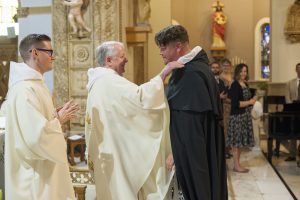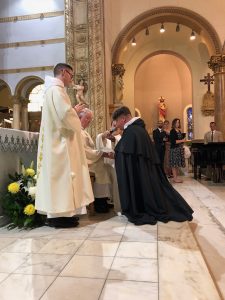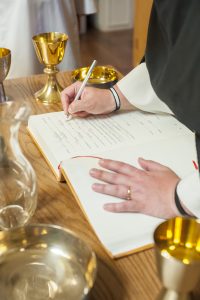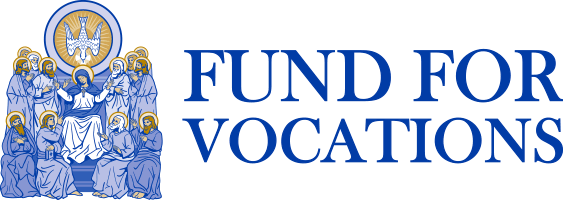MEFV grant recipient Brother Joseph Paul Albin, OP made his solemn profession this summer with the Dominican Friars of the Province of St. Martin de Porres. He spoke with us in late August about his journey back to the faith of his upbringing, about life in formation, and about what MEFV’s support has meant.
What was your early faith formation like?
I was raised in a Catholic family, so I grew up knowing Jesus Christ and I knew priests and the sacraments from a young age. Then in my high school years, my faith grew lukewarm. I would still go to Mass, but it was mostly to keep the peace with my mom. And I would usually go to Mass on Ash Wednesday. But then once I went away to college (University of Missouri, class of 2008), I really even stopped going to Mass. It wasn’t so much that I became some sort of committed atheist. I was much more your typical noncommittal “none.”
 So what brought about your reversion?
So what brought about your reversion?
One of the requirements for my religious studies program at college involved attending worship services of a variety of faiths, so I went to Hillel, and the Muslim Student Association . . . and the Newman Center. The Newman Center sponsored a weekend “awakening retreat” and I went and forged connections with people who were in the same place I was: fallen away but still feeling what Dorothy Day called “haunted by God.” That retreat was a turning point. And then I began one-on-one religious instruction in the theology of the Eucharist with Jill Raitt, who founded the University’s religious studies program, and I began studying more and more about Catholicism and was genuinely stunned to discover how completely wrong most of my assumptions had been.
Such as?
For example, I was very interested in Buddhism and other Eastern religious traditions. I was deeply drawn to the contemplative aspects of those religions, and I just assumed Catholicism had no such thing! Of course, the fact is that Christian mysticism and contemplative life date back to the earliest days of the faith. My own order, the Dominicans, was first founded as a community of contemplatives, more than 800 years ago. And I thought Christianity in general and Catholicism in particular was intellectually lazy and required mindless blind faith that you were not allowed to question. And then I discovered the Summa Theologiae which systematically presents and responds to every question I had ever had about the faith and then some. In hindsight, it’s actually comical, how completely misplaced all my misgivings were. Or it would be comical—except that so many young people are so similarly poorly catechized and wandering around oblivious to the richness of their own inheritance. I feel very at home now, and it turns out I was born into my true home.
 Why the priesthood, and why the Dominicans?
Why the priesthood, and why the Dominicans?
Part of my studies involved an internship which meant moving into living quarters attached to the church. I started going to daily Mass because there was no excuse not to, when it’s literally in your home. And there’s also the power of dwelling in the same space where the Blessed Sacrament is reserved. I had thought I was called to do campus ministry, and I moved to New Orleans to graduate work at Loyola in that field. But ultimately, the Dominican order just felt like home. Pierre Teilhard de Chardin once said that “joy is the most infallible sign of the presence of God” and I just felt that joy when I went on a Dominican “come and see” vocation discernment retreat.
With which apostolates have you worked so far?
I work one day a week in a L’Arche house (a group home for people with intellectual disabilities). The residents of that house are completely without guile, and they draw out your gifts in a way that it’s hard to imagine happening any other way. One of them said to me “How would you like it if I came over to your house wearing a white dress and made dinner for you?” and I realized, OK, that is how I appear to them! Another powerful experience was working in the slums of Nairobi, Kenya, during the summer of 2015. I worked on kitchen duty at an orphanage for girls who are physically and intellectually disabled. I had been out of the country before, but only for vacation, which doesn’t really take you outside your “own kind.” I had never actually lived and worked before in a place where I was the minority culture, and preparing food every day for 40 to 50 people has a way of grounding you in reality.
What has been the biggest surprise about formation?
Probably just how transformational the vows are. People hear “poverty, chastity, and obedience” and it just sounds like deprivation and misery. It is undeniably true that there is an ascetic nature to the vows, but it is also really deeply true that they orient you to a freedom in Christ that is so hard to achieve for so many of us. There are many holy lay people who maybe do not need the help of the vows to stay focused. But what has truly surprised me, and continues to, is just how freeing this vocation has been. The things that the vows supposedly deprive you of, they are actually freeing you from.
 Are there particular saints or biblical characters with whom you most identify, or on whose intercessions you most rely?
Are there particular saints or biblical characters with whom you most identify, or on whose intercessions you most rely?
I probably identify most with St Peter, just because he was so completely human in both his weakness and his love. He loved Jesus so much, and yet so consistently and publicly failed Him. The fact that Jesus so loved Peter, too, and entrusted this flawed man with the keys to the kingdom—it’s all very reassuring. It means that I can still be in friendship with Our Lord despite my own failures and weaknesses. I rely a lot on the intercessions of St. Dominic, of course, and also of Dorothy Day to whom I pray especially when I am struggling with community life. And I have a great devotion to Our Lady. There is one image particularly, Our Lady of Perpetual Help, where she is holding the Christ Child who has seen a vision of the instruments of His crucifixion and has run so fast to her that one of His shoes has come off. That image of her as someone to whom you can run for comfort, who will hold you and draw you into that same place where she held Christ Himself—that is an image I keep in my mind.
Is there anything you would like to say to the lay faithful about this particular moment of crisis in our Church’s history?
Just that it is OK to be angry and confused. I certainly am, and I am also very aware that my feelings are small and meaningless compared to those of the victims of such awful sin. The thing to remember is that we are not the ones who make the Church holy or unholy. Christ makes the Church holy. It’s not about us, or about the priests or bishops. It’s about Christ who alone makes the Church holy and makes life worth living. I also really hope that people can avoid taking sides or choosing teams. This is not a liberal versus conservative issue. Satan is very good at dividing and conquering. Don’t do it. Let the truth be the truth. Let Christ be Christ. Be on His side.
Can you tell us what the grant from the Mater Ecclesiae Fund for Vocations has meant to you?
Very simply, it has meant that I had the opportunity to follow Christ’s call for my life. This life has already been so fulfilling and so rich. And I constantly come to love it more and more: Christ, his people, our life together, our hope for heaven. Just having this opportunity, this life, means absolutely everything. When Christ opens up a door for you, you have to step through it. Mater Ecclesiae Fund for Vocations knocked down that barrier. You were Christ’s instrument in opening up that door. I am just so grateful.
